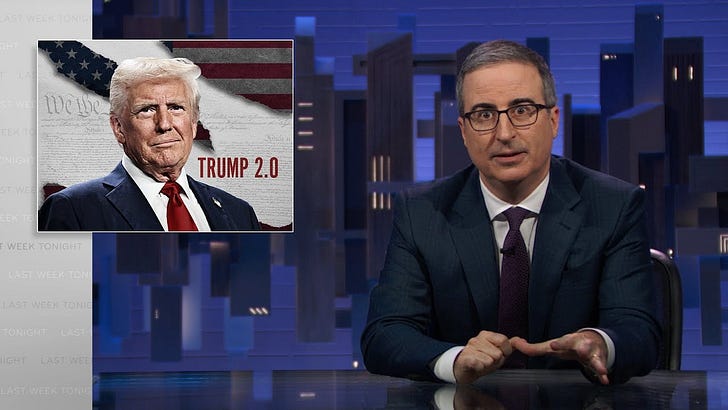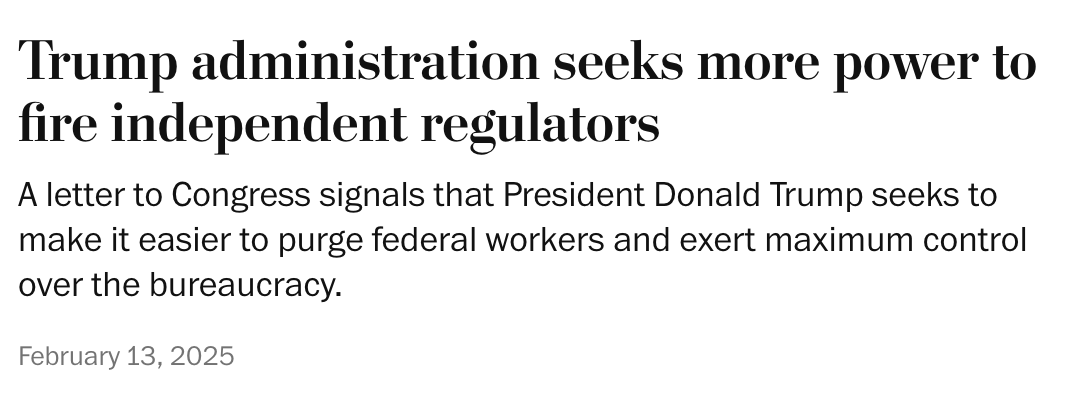What research tells us about politicization and state capacity
Also, Last Week Tonight on Trump's government takeover
Last Week Tonight is terrific at policy explainers. Last year they also did a deep dive on Schedule F, Trump’s plan to politicize the civil service. A couple of weeks back I chatted with some of the show’s producers about how Trump is attacking government, and so was looking forward to seeing this episode roll out. It gets at some of the core issues I’ve written about, but succinctly and in a way anyone can understand. Its a good one to share.
This also gives me an excuse to share a bit more of my essay in the Journal of Policy Analysis and Management about politicization of the public service (you can read more from the essay here).
The Trump administration is telling you it’s rapid actions are in the name of performance. But what does high-quality peer-reviewed research actually say?
Politicization erodes both state capacity and performance. For example, a cross-national review of 52 countries found that non-politicized, merit-based hiring and tenure protections were associated with higher performance and lower corruption. Comparison of program evaluations during the George W. Bush era for programs run by political appointees relative to those run by career officials show the appointees are associated with lower performance. Historical State Department Inspectors General reports finds that career officials perform better than appointees in diplomatic positions. In certain areas, we see direct evidence of performance improvement using historical records that track the introduction of merit systems. The use of merit systems improved the performance of police departments in reducing violent crime. A study of the postal system found that its performance increased after the introduction of the civil service system in the 1880s.
There are multiple causal mechanisms by which politicization undermines capacity. Here I focus on the effects of politicization on the people in government, their skills and incentives:
Prioritizing political loyalty leads to the hiring of more politically connected but less competent individuals.
Public employees are more likely to exit when they have experienced more politicized work environments.
Politicization replaces moderates with zealots. Civil servants tend to have more moderate political views than political appointees, and are more accustomed to organizational norms that they must temper their political preferences compared to appointees who seek to quickly implement their partisan agenda. Zealots are more likely to make errors, and neglect constituencies not part of their coalition.
Politicization replaces experienced managers with inexperienced managers. The average time in office for political appointees is 18-24 months. Performance differences between political appointees and career officials is explained by less task-specific experience among appointees. The improvement in Post Office performance after the introduction of the civil service system was because of a reduction in turnover, especially in election years.
Employees will have less reason to invest in maintaining and expanding their skills. Individual employees have little incentive to invest in their own skillset in an environment where they can be easily removed, and where expertise is devalued. A history of the US civil service system is consistent with this expertise model, showing that tenure creates an incentive structure where employees invest effort in building skills of particular value to the public sector. Contemporary public managers who face politicization are less likely to make investments in expertise.
Politicization creates a chilling effect that damages the flow of factual but uncongenial information. For example, on-the-record government sources are not contradicting Musk’s lies about government programs.
Politicization invites waste and corruption. Procurement processes represent a huge portion of spending, equivalent to about half of domestic discretionary spending. Investments in civil service capacity reduce costs, giving the state greater capacity to manage contractors, while a reliance on consultants is associated with higher costs in infrastructure. Maintaining sufficient capacity to monitor private providers of public services is essential to constraining waste. For example, every dollar in spending on civil servants to monitor Medicare overspending saves between $24-$29. Historically, civil service systems limit the ability of politicians to spend in ways designed to ensure their re-election. Even with civil service systems, federal departments with more political appointees are more likely to provide non-competitive contracts and see greater turnover with contracts, indicating political favoritism in the provision of public spending.
Politicization might be justified in the name of improved democratic responsiveness. And more politicized regimes do provide more responsiveness to the political executive in narrow terms. But they undermine democratic responsiveness in two other ways.
First, responsiveness includes the ability to achieve policy goals, and weakening capacity undermines this type of responsiveness. For example, Presidents are less able to effectively use one of their most powerful policymaking tools – rulemaking – when agencies have less capacity. They are therefore more likely to achieve policy goals by delegating autonomy to a nonpartisan civil service, even when they distrust the bureaucracy.
Second, politicization reduces democratic responsiveness to other legitimate actors and other legitimate values, such as transparency. More politicized agencies are less responsive to information requests from Congress and the public. This lack of responsiveness to Congress is especially pronounced when members of the opposite party make information requests, either about policy or constituent services. Right now, Democrats cannot get straight answers to basic questions about what the Trump administration is doing.
State Capacity is Important but Invisible
Trump and DOGE are promising to save money, but are slashing and burning government in a way that is having an immediate impact on state capacity. By contrast, state capacity—the ability of government to perform tasks to serve the public—is a more abstract concept. Defending state capacity is made harder by the fact that voters often do not reward capacity investments, especially long-term or less tangible investments.
For example, voters reward politicians for relief spending after a disaster, but not for preparedness spending to reduce the effects of a disaster. Voters punish performance failures, but do not reward excellent performance. Politicians are therefore incentivized to avoid immediate and public failures, or to address failures only after they occur, but not to make long term capacity investments that will not pay off in obvious ways for years.
Such public preferences and policymaker responses make it difficult to make a prospective and results-based case for capacity. In relatively stable democracies, such a case may seem unnecessary if there is broad consensus about the role of the public sector, and public services work reasonably well. Clearly, that is not where we are right now.
To ignore state capacity (as the US has largely done for decades) is not just the luxury of those living in a reasonably functional state. It is also an invitation for the degradation of that capacity. The importance of capacity is most apparent in its absence. Taking capacity for granted makes it easier for politicization to take hold. In the last few years, once seemingly settled questions on issues like the functioning of the civil service in the American state have been reopened and become central in our political debates, driven by a theory of government that often treats the mere existence of state capacity as an illegitimate attack on democratic values.
State Capacity Takes Time to Accumulate and is Vulnerable to Erosion
State capacity can be vulnerable to unusual shocks or anti-democratic environments. For example, White political elites in the post-Reconstruction American South weakened bureaucratic capacity of local government to limit redistribution. Rent-seeking political elites might oppose state capacity if it subjects them to closer accountability.
At the current moment, the richest man in the world is leading a legally dubious project to downsize government services, at the behest of a billionaire President who is creating a personalized legal infrastructure to protect himself and pursue his enemies. It is fair to characterize this as an unprecedented negative shock to state capacity.
Capacity depends upon formal (e.g., job protections) and informal (e.g., organizational norms) public sector practices. Such practices are incorporated into broad bargains between politicians and public employees, where the terms of the bargain are at least partially implicit. As it becomes clear that there is no consensus about those practices —that the norms will not be honored—it becomes harder to maintain the credibility of the public service bargains or rebuild them once they are clearly violated.
For example, we have significant evidence that many workers are motivated to serve the public interest. A public service bargain that allows public employees a long-term time horizon and autonomy to make a difference in their work is therefore an efficient way to attract and retain a high-capacity workforce relative to other options. However, such a bargain depends upon a consensus around job protections and delegations of autonomy to bureaucrats, a consensus which has been disappeared in American politics as the Republican Party has accused public employees as being part of a rogue “deep state”.
As political actors impose a new public service bargain upon public employees, one characterized by less autonomy and greater politicization, employees driven by a public service motivation will be more likely exit. What is more, it will be difficult to convince potential recruits that it is possible to re-establish an attractive public service bargain. '
I worry that the DOGE slash-and-burn assault on government, where young and ignorant Musk acolytes treat public servants like disposable pieces of trash will have a lasting negative effect. Even after Musk and his wrecking crew leaves, how can a future government credibly re-establish public service bargains that are attractive to people who care about public services?
Anyway, lets go out on this gift discovered on Last Week Tonight.






Thank you for your excellent research and thoughtful analysis. Much appreciate your ability to identify the key issues and connect with findings from your and others research.